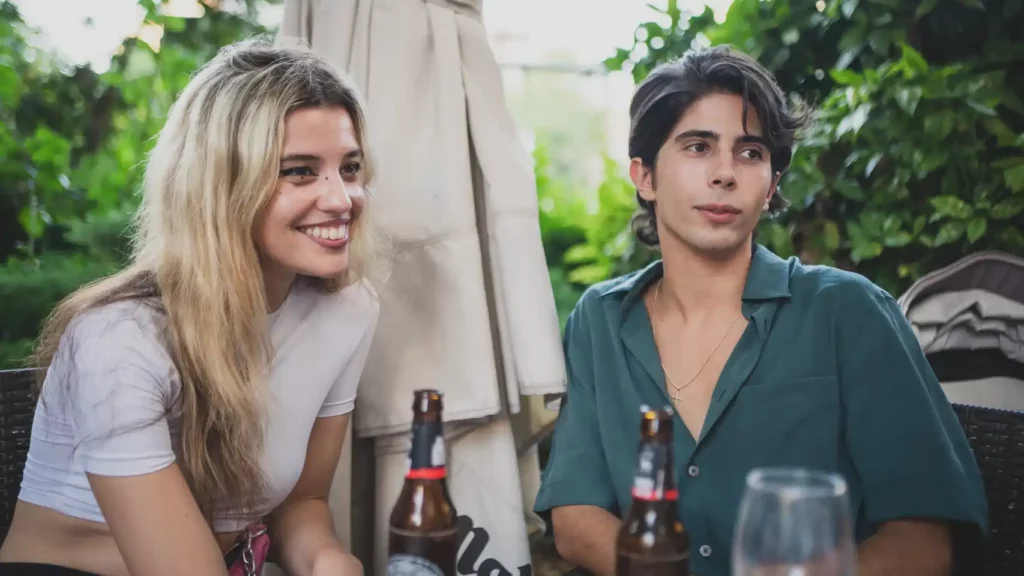Contributor: Bryan Winkler, Instagram: @bryan_winkler
¿Qué eres, más pija o más quinqui?[1] is probably not something you would ask a stranger, much less a prime minister. But this question encapsulates the plainspoken essence of the Spanish podcast La Pija y la Quinqui, where hosts Carlos Peguer (La Pija) and Mariang Maturana (La Quinqui) use it to engage with a diverse range of guests. Many prominent figures and celebrities have been interviewed on the podcast, including Sebastián Yatra, Aitana, Nathy Peluso, Rosalía, and even the prime minster of Spain, Pedro Sánchez.
“La Pija y La Quinqui finds its enduring, wide-reaching appeal in the quotidian, in the banalities and representations of everyday life.”
Carlos and Mariang, originally from Extremadura and Murcia, respectively, started the podcast from the confines of their Madrid apartments in 2022 before it was picked up by Spotify and Zalando for subsequent seasons. Now with around 100,000 Twitter followers each, featured in Vogue Spain, and interviewed in La Resistencia, Carlos and Mariang have undoubtedly become influencers. In a potentially interesting extension of what Pérez calls the “Insta-flix celebrity,”[2] I propose that Carlos and Mariang have, in a similar way, become celebrities by using new media products, tying together fashion, advertising, and personal brand promotion. As Pérez points out, the Insta-flix celebrity must “humanize” their image so that they seem closer to their followers (8). In the case of Carlos and Mariang, they routinely humanize their projected selves by talking extensively about their personal lives. From being overworked and underpaid—a problem that certainty resonates with listeners in Spain and abroad—to novios que ponen cuernos, Carlos and Mariang continually relate to the everyday troubles of their listeners. This candid abroach has occasionally placed them in líos, however, like when Carlos was criticized for talking about how his €7 Starbucks coffee was vital for his mental health (he contends this was a joke) or when his complaint to Renfe about a delayed train resulted in an unexpected social media backlash.

Now in its third season, La Pija y La Quinqui finds its enduring, wide-reaching appeal in the quotidian, in the banalities and representations of everyday life. Routine discussions of Carlos’ passion for monogamy and Mariang’s scabies troubles take place in a light-hearted, authentic, and amicable environment. The podcast que no aporta nada[3] does, in fact, provide an important sense of connection, a weekly sense of familiarity in which friends come together to engage in spirited conversations, all while sipping on a caña or vinito with their guest. Part of the podcast’s success, I believe, resides precisely in this informal format. It is reminiscent of the value for enjoying everyday life (cotidianidad)prevalent in Spanish society; spontaneous chats with friends in the bar de al lado are a tenant to Spanish culture and are replicated in the show. In an increasingly disconcerted, disconnected world, where the global—war, pandemics, and moribund ecologies—and the personal take a toll on the body and the spirit, there exists both a desire and a need to be in relation with those around us. La Pija y la Quinqui emulates this digitally, where what’s important is not Pedro Sánchez’s campaign strategy but, rather, his Spotify playlist and bromance with Emmanuel Macron.[4]
Give it a listen on Spotify and on other podcast streaming platforms.
[1] Pijo and quinqui represent two contrasting faces of Spanish culture. Pijo is an adjective and noun used in reference to a posh, preppy individual; a quinqui person is someone with a rougher, less refined character.
[2] Pérez, Jorge. “Netflix, Instagram, Celebrity and Fashion: A Brave New Convergent World?” International Journal of Iberian Studies, vol. 36, no. 2, Intellect, 2023, pp. 125–41, https://doi.org/10.1386/ijis_00098_1.
[3] This is taken from an article published in El Confidencial, “La Pija y la Quinqui no están solas: por qué triunfan los pódcast ‘que no aportan nada.’”
[4] Beyond the scope of this opinion piece, but surely interesting to think about, is the political savviness deployed by guests in the show. The episode with Pedro Sánchez, for example, was released one week before the 23J general elections. It is not outside a logical pattern of thought to assume that attempt to “humanize” himself (as Pérez argues) surely served a political goal.
Foto del post: “La Pija y la Quinqui.” Vogue España, Condé Nast, 9 Jan. 2023, https://media.vogue.es/photos/63bbee3d77218d4822d29351/2:3/w_2240,c_limit/LaPija_ElQuinqui_0030ok.jpg
